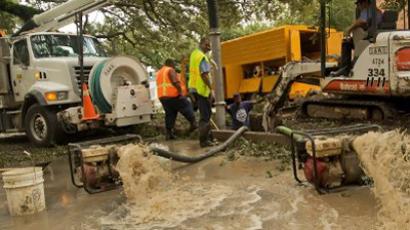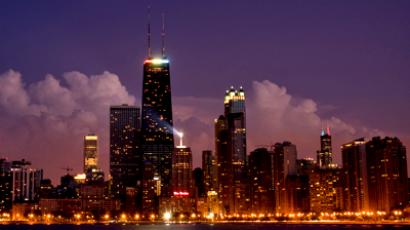US streets full of formerly-middle class
The world is now seeing the economic uncertainty of the US, but for many Americans it has been apparent for quite some time.
Economic despair has been spreading across our nation and it can be seen by the rising number of middle class Americans losing their homes. In some cases, joblessness and inability to pay rent has forced people to live in their cars, shelters or on the sidewalk.Many Americans who wind up living on the streets never thought their economic prosperity would eventually become economic ruin.“Before I moved here, I had a 3-bedroom 2-bath house,” said Kevin Payton, a man who now lives on the streets of San Diego, CA. “I had two cars and a truck, a big front yard. Two dogs, one in the front one in the back,” Payton added.As an electrician in Louisiana, Payton enjoyed financial stability. After being laid off, he headed west in search for work in sunny San Diego, but Payton has been unable to land a job in the expensive city. Within months, he ended up on the streets begging for change. Job interviews for Payton are a frustrating experience.“They’re saying I’m over qualified. What does that mean? I have no idea. But they say I’m over qualified. A job is a job,” said Payton.Payton is not alone when it comes to formerly-middle class Americans, unable to find work and ending up on the street.“I used to be a nurse assistant for a convalescent hospital for the elderly,” said a homeless woman named Nina.She is so embarrassed about her financial situation, she hasn’t come clean to her relatives about how bad things have gotten.She now sleeps on a mattress on the street corner.It is a rough life, made even more difficult as police enforce measures to push homeless people out of certain neighborhoods. “There are people all over the city in cars,” said Carol Sobel, an attorney with the National Lawyers Guild.With more people finding high rents, or mortgage payments impossible to pay, sleeping in a car or motor home has become a widespread, last resort.“They told me not to sleep inside my car or my motorhome. I will go to jail for that,” said a homeless man in Venice named Angel.Angel has been threatened by police for living in his pickup truck.“We live in a city where people are one pay check away from being homeless,” said Sobel. “If you go down on skid row, that’s what you see. People lost an apartment, they wound up there and it becomes a cycle you can’t get out of,” Sobel added.Those trying to help the homeless may become a target as well.Activists have been arrested for feeding transients in Orlando, FL, one of the several American cities where feeding the homeless is outlawed.“It could be you. Most people are one or two paychecks away from losing their housing. And that’s just the truth,” said Peggy Lee Kennedy, an activist with Food Not Bombs.Nationwide, the unemployment rate is nearly double digits and many economists agree, that number is likely higher as more Americans give up hope and drop out of the work force altogether.Food pantries are under high demand and a record 45 million people are now on food stamps.If it weren’t for these services, who knows how many people might be might be on streets?“The government doesn’t care about anything,” said Payton. “Whatever will get them richer and richer, make us poorer and poorer,’ he added.As the government struggles to get its own financial house in order, the U.S. economy is not showing any signs of getting better, leading many to wonder if tent cities and people living in their cars, will be the new normal for America.














